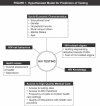Routine HIV testing in Botswana: a population-based study on attitudes, practices, and human rights concerns
- PMID: 16834458
- PMCID: PMC1502152
- DOI: 10.1371/journal.pmed.0030261
Routine HIV testing in Botswana: a population-based study on attitudes, practices, and human rights concerns
Erratum in
- PLoS Med. 2006 Oct;3(10):e395
Abstract
Background: The Botswana government recently implemented a policy of routine or "opt-out" HIV testing in response to the high prevalence of HIV infection, estimated at 37% of adults.
Methods and findings: We conducted a cross-sectional, population-based study of 1,268 adults from five districts in Botswana to assess knowledge of and attitudes toward routine testing, correlates of HIV testing, and barriers and facilitators to testing, 11 months after the introduction of this policy. Most participants (81%) reported being extremely or very much in favor of routine testing. The majority believed that this policy would decrease barriers to testing (89%), HIV-related stigma (60%), and violence toward women (55%), and would increase access to antiretroviral treatment (93%). At the same time, 43% of participants believed that routine testing would lead people to avoid going to the doctor for fear of testing, and 14% believed that this policy could increase gender-based violence related to testing. The prevalence of self-reported HIV testing was 48%. Adjusted correlates of testing included female gender (AOR = 1.5, 95% CI = 1.1-1.9), higher education (AOR = 2.0, 95% CI = 1.5-2.7), more frequent healthcare visits (AOR = 1.9, 95% CI = 1.3-2.7), perceived access to HIV testing (AOR = 1.6, 95% CI = 1.1-2.5), and inconsistent condom use (AOR = 1.6, 95% CI = 1.2-2.1). Individuals with stigmatizing attitudes toward people living with HIV and AIDS were less likely to have been tested for HIV/AIDS (AOR = 0.7, 95% CI = 0.5-0.9) or to have heard of routine testing (AOR = 0.59, 95% CI = 0.45-0.76). While experiences with voluntary and routine testing overall were positive, 68% felt that they could not refuse the HIV test. Key barriers to testing included fear of learning one's status (49%), lack of perceived HIV risk (43%), and fear of having to change sexual practices with a positive HIV test (33%).
Conclusions: Routine testing appears to be widely supported and may reduce barriers to testing in Botswana. As routine testing is adopted elsewhere, measures should be implemented to assure true informed consent and human rights safeguards, including protection from HIV-related discrimination and protection of women against partner violence related to testing.
Conflict of interest statement
Figures
References
-
- WHO. Leading the health sector response to HIV/AIDS. Geneva: World Health Organization; 2003.
-
- Global HIV Prevention Working Group. Access to HIV prevention: Closing the gap. Bill and Melinda Gates Foundation and Henry J. Kaiser Foundation; 2003.
-
- Sweat M, Gregorich S, Sangiwa G, et al. Cost-effectiveness of voluntary HIV-1 counselling and testing in reducing sexual transmission of HIV-1 in Kenya and Tanzania. Lancet. 2000;356:113–121. - PubMed
-
- The Voluntary HIV-1 Counseling and Testing Efficacy Study Group. Efficacy of voluntary HIV-1 counselling and testing in individuals and couples in Kenya, Tanzania, and Trinidad: A randomised trial. Lancet. 2000;356:103–112. - PubMed
-
- Global HIV Prevention Working Group. HIV prevention in the era of expanded treatment access. Bill and Melinda Gates Foundation; 2004.
Publication types
MeSH terms
Grants and funding
LinkOut - more resources
Full Text Sources
Medical
Research Materials


